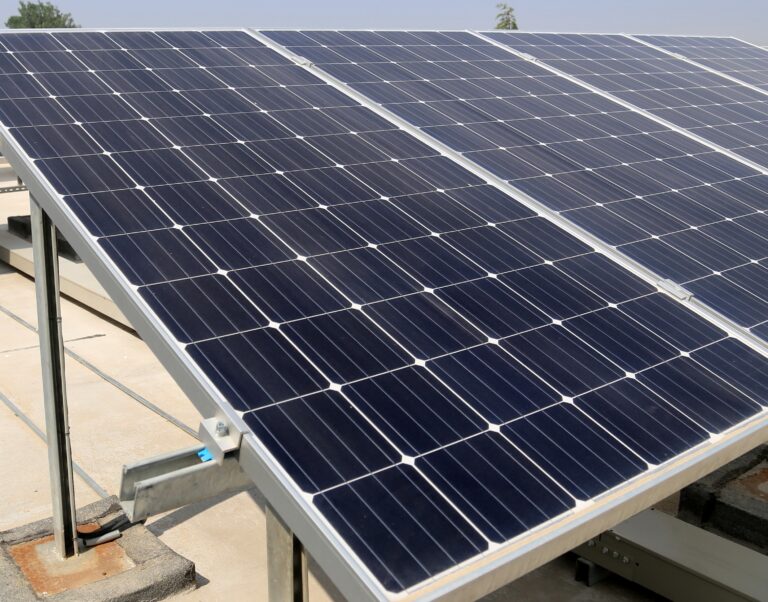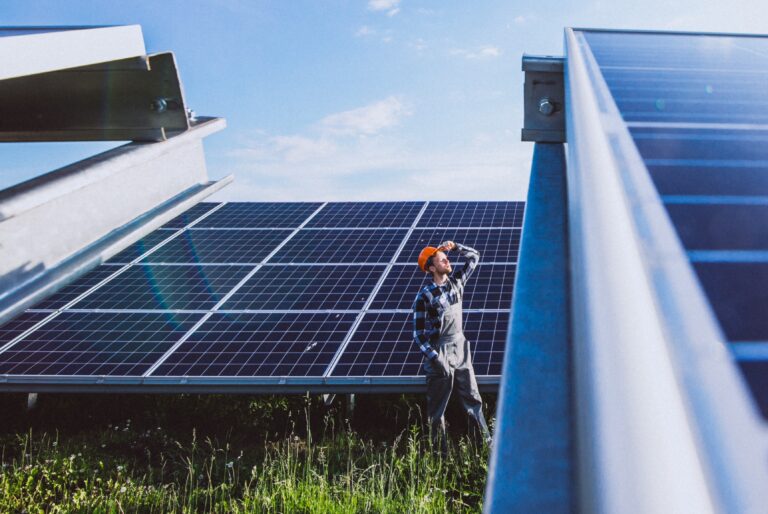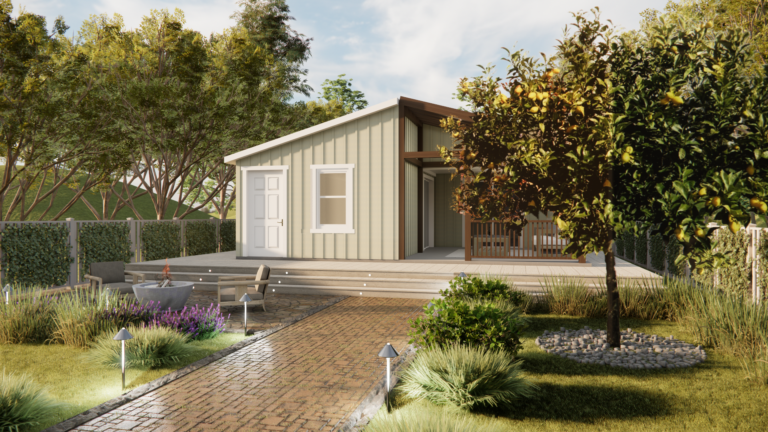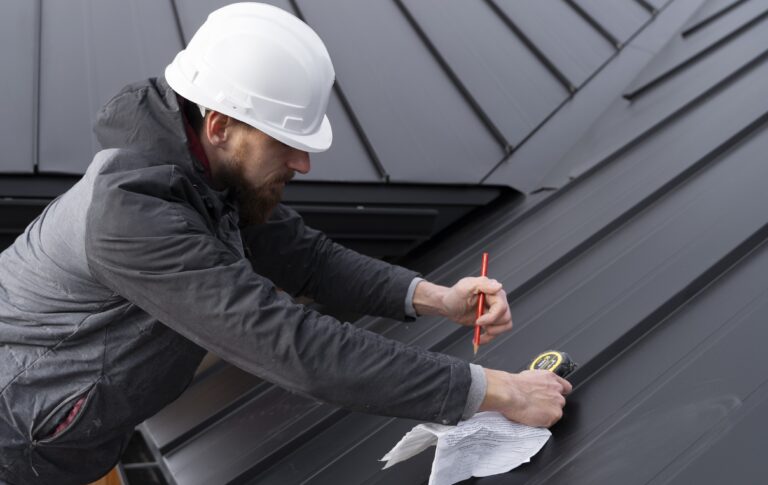Harnessing the Sun: Solar Power Solutions for Your California ADU
Brandon Hustlar June 06 2025
Also known as a Photo Voltaic panel, a solar panel is a device that converts sunlight into electricity. It does this by using particles of light called photons. Solar panels comprise many solar cells, which have silicon, phosphorus, and boron layers. When photons enter these cells, they knock electrons loose, making an electric current.
It’s interesting how the solar panels work, they grab sunlight and transform it into electricity that can be used immediately or stored in batteries for later use. If your panels produce more electricity than you use, the extra power can be sent to the main grid, sometimes earning you an extra income (usually perceived as a discount in your electricity bill).

Benefits of Installing Solar Panels on ADUs
Installing solar panels on your ADU offers several advantages:
• Reduced electricity bills: Solar panels can significantly lower or even eliminate your ADU’s electricity bills, saving you money in the long run.
• Increased property value: Studies show that ADUs with solar panels tend to have higher resale values than those without solar panels.
• Reduced environmental impact: Solar power is a clean and renewable energy source that helps reduce greenhouse gas emissions and contributes to a more sustainable future.
By installing solar panels on your ADU, you can enjoy these significant benefits while also contributing to a more sustainable future.

Schedule a complimentary call with an ADU specialist
Residential solar panel installations are done to suit different needs and preferences. Here are the main types:
1. Solar Panels on Roof
Rooftop solar panels are the most common type for homes. They are installed on the roofs of single-family homes and use the sun’s energy to make electricity. This type of installation allows homeowners to save on electric bills and reduce their carbon footprint. Modern rooftop solar panels are a lot cheaper than ever and can add more value to your home in case you sell it.
2. Solar Panels on Ground
If your roof is a metal or tile roof you will not be able to install the solar panels, you can install them on the ground where you will get the max amount of sunlight in the day. This type of solar panels installation is set up on stands in your yard. They are perfect for homes with plenty of land and provide easy access for maintenance and cleaning.
Most of the time this type also allows for maximum positioning to capture the most sunlight.

Carport and Pergola Solar Panels
Carport and pergola solar panels give shade and make electricity at the same time. Carports are installed over parking areas, while pergolas are added to garden structures. These installations are perfect for homes that want to maximize space and utility.
Solar Batteries
To store the extra energy for use when the sun isn’t shining, you can install solar batteries to the systems. Batteries are a great option for increasing energy independence and providing backup power during outages. However, they can be costly, so many people still stay connected to the grid.
Each of these residential solar installations help reduce dependence on fossil fuels, save money, and contribute to a cleaner environment.

Considerations for ADU Solar Installation
Before embarking on an ADU solar installation project, it is important to consider several factors to ensure a successful and cost-effective implementation:
• Cost: The upfront cost of solar panel installation can be significant, but the long-term savings on electricity bills and the potential increase in property value often offset the initial investment.
• Roof Suitability: Your ADU’s roof should be large enough and have the correct orientation to accommodate solar panels.
• Permits: You may need to obtain permits from your local government before installing solar panels.
• Professional Help: It is advisable to consult with experienced solar installers to determine the specific requirements for your ADU project and to choose the most suitable solar panels.

By carefully considering these factors California Energy Commission regulations require solar panels for new Detached ADUs, which can be installed on either the ADU or the main dwelling, but if the ADU is created within existing space or added to an existing home, solar panels are not required. This exemption also includes converting non-residential buildings like garages into residential spaces. The California Energy Commission (CEC) enforces these rules to promote energy efficiency and renewable energy use in new constructions.
Schedule a complimentary call with an ADU specialist
You can make an informed decision about whether to install solar panels on your ADU and ensure that the installation process is smooth and successful.
What is the cost of going solar?
The average cost of installing solar panels in the U.S. is about $19,000, though the price can go from $16,500 to $21,000 depending on factors like location, kilowatts you use, and equipment type. The cost is calculated per watt, with the normal being around $3.00 per watt.
Remember that when installing a solar system, you’re paying for more than just the panels. Costs include installation labor, electrical materials, racking, and inverters. Soft costs, such as permitting and company overhead, also add up to the total price.

Several factors influence the cost:
Electricity Usage: The more power your ADU use means you need more solar panels.
System Size: The bigger the system the more it will cost. For example, a 10 kW system might cost $30,000, while a 6 kW system costs around $18,000.
Location: Less sunlight mean you need larger systems, and local labor rates and permits can vary.
Roof Characteristics: Complex roof designs or higher floors can increase labor costs.
Equipment Type and Brand: Monocrystalline panels and premium brands cost more but are more efficient.
While solar panel systems are now cheaper than ever down over 60% since 2010 they’re still a pricey investment. Incentives like the federal tax credit and local rebates can help reduce costs. Solar panels can save you an average of $1,500 per year on electric bills, allowing the system to pay for itself in about 12 years.

The federal solar tax credit is an investment tax credit (ITC), incentivizes investment in solar energy. Extended through 2034 by the Inflation Reduction Act, it allows a tax credit of up to 30% of eligible costs, with no income limit. The 30% rate will stay through 2032. To get this credit, fill out IRS Form 5695 when filing your taxes. You’ll need information from Form 1040 and details about your energy project costs, plus certification from the equipment manufacturer. Your tax accountant will be the perfect person to tell you exactly what you will need to get the tax credit.
Solar panels are a practical and efficient way of generating clean energy, to put it simply. Roof, ground, carport, pergola, etc. They are a good investment, especially with incentives like the federal tax credit, but they can be expensive, but they can pay them self-off in the long run.
Prefab Homes
hello@homeplex.net
(424) 428-8000
145 W Broadway
Long Beach, CA 90802
DRE #02186195
© 2025. All rights reserved. HOMEPLEX, The New American Dream are registered trademarks of HOMEPLEX, INC.


